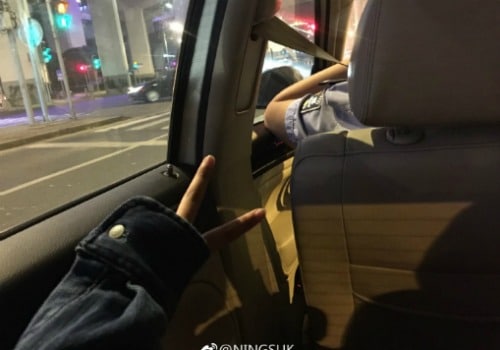A personal story by a Weibo netizen about an altercation with a Muslim man on the Bund in Shanghai has stirred wide debate on Chinese social media. The case has evoked both anti-Islamic sentiments and anger about censorship in the name of ‘ethnic unity.’
The account of a female Weibo user nicknamed ‘Ningsuk’ sparked a storm of debate over the past few days after the woman explained in detail how she was allegedly harassed by a Muslim man in Shanghai on the night of September 14th.
On her Weibo account, the woman wrote that she was “attacked by a Middle Eastern-looking Muslim man” and that the man also told her he was an Arab Muslim.
The incident caused a wave of online anger for various reasons. At first, her story mainly triggered anti-Islamic sentiment. When ‘Ningsuk’ later wrote on Weibo that her posts about the incident had been deleted for “undermining ethnic unity,” netizens were outraged about the alleged censorship of the story.
NINGSUK’S ACCOUNT
“He told me that there are many Arabs/Muslims in this area, and that they are all united.”
On the evening of September 15, Ningsuk wrote her initial long account on Weibo of the incident that happened on Thursday night.

The original post on Weibo
In her account, she writes that she arrived in Shanghai to meet her friend on Thursday after taking the train from Beijing. Since her friend was not able to meet her at the train station, they had agreed to meet later at the Starbucks on the Bund, where ‘Ningsuk’ arrived at 8.00 pm.

As ‘Ningsuk’ was having a coffee in the outside seating area, she writes that “a man with an Arabic appearance” asked her if the seat next to her was taken, joined her at the table, and started talking to her in Mandarin, asking if she was alone. “I told him I was waiting for my boyfriend,” the woman writes.
The woman then describes how the man took on a threatening tone: “He told me that there are many Arabs/Muslims in this area and that they are all united, unlike Chinese who just mind their own business. He said that with one phone call, he could have many people come over.”
Because ‘Ningsuk’ was meeting her friend there, had all her luggage with her, and her phone was almost out of battery, she did not want the situation to escalate, she writes. As he the man spoke to her about his “many friends,” she tried to reach her friend and told her to hurry.
When the man pulled his chair towards the woman and cornered her, saying “he did not have bad intentions,” and put his hands on her shoulder for “taking a picture,” she got up and ran into the Starbucks.
She writes: “He followed me inside [the shop] and forcefully grabbed me and pulled me to the corner. At this point, I started to shake and he continued to say that there were many (Muslim) people in the area that he could call over with one phone call.”
When the man then grabbed her and tried to pull out of the Starbucks, she ran behind the cashier’s desk and asked the staff for help. The man left the store, she writes, but waited for her outside and came back in at one time and attempted to slap the woman before the Starbuck’s manager stepped in and made him leave again.
After the woman’s friend arrived, the two women were threatened by the man once more outside the store before finally leaving together.
ONLINE ANGER OVER CENSORSHIP
“I should not cause racial tensions – the police contacted me.”
Ningsuk’s post received thousands of comments and over 30,000 shares. Many people responded with indignation, with some saying: “This is how it starts (..) we as Han Chinese have no feeling of safety (..).”
Triggering so many reactions, Ningsuk’s story was deleted not long after its initial publication.
The deletion also stirred much anger on Weibo, where many netizens suggested the post was only shut down because it involved a Muslim man and that personal safety issues matter more than ethnical sensitivities.
The woman ‘Ningsuk’ later posted: “I should not cause racial tensions – the police contacted me. I’m safe now, the original post has been deleted.”

Photo posted by ‘Ningsuk.’
She also confirmed to her followers that local authorities had reached out to her, that she met with them and that they were investigating the case. She also said that people were banned from commenting on any of her posts regarding this story.
SUSPECT ARRESTED
“I am very, very shocked that it turns out he is actually a Chinese person.”
On September 16, Shanghai police released a statement that they had detained a 23-year-old man for “repeatedly harassing [the] girl after he was drunk on Thursday.” According to the woman, the police stated the suspect was a Muslim of Chinese nationality.
She wrote: “They got him. The police let me see the person’s identity card and name. I am also very, very shocked that it turns out he is actually a Chinese person from a certain region. I asked the police whether or not he admitted that he had said he was an Arabic man and the police told me he admitted this, and that he says he talked big talk because he had too much to drink [that night]. They also have verified that he is a Muslim.”
Within 24 hours, her last post was also shared over 26000 times.
Many netizens commented that they were happy the police arrested the suspect, but that it still did not validate the censorship of the woman’s story. There are also people who praise the woman for “having the courage” to put her story online despite its sensitivity.
“A girl is harassed by a Muslim man in a public place. Then all she does is she goes home and writes about it on Weibo. Then the relevant departments are directly on the phone and warn her not to destroy national unity, and then the police take her to ‘drink tea’ and then the post is completely deleted. This whole issue is not a mystery,” one person responded.
STATE MEDIA RESPONDS
“The online sentiments are complicated, and most internet users are convinced that the reason the woman’s post was deleted is because she said her harasser was Muslim.”
On Monday, Chinese state tabloid Global Times responded to the issue through its ‘opinion column’ by Shan Renping (单仁平), saying that it is only the woman who confirmed the man was indeed Muslim and that the police gave no official statement about his background.
“The online sentiments are complicated, and most internet users are convinced that the reason the woman’s post was deleted is because she said her harasser was Muslim. They are also unhappy with the fact the police did not [publicly] reveal the identity of the suspect.”
The column stresses that the Chinese state will prosecute everybody equally based on their crime and not their race, ethnicity or religion: “No matter who breaks the law (..) it does not matter what race or religion they are, the officials will always handle it according to law without any hesitation.”
It also said that officials always hide religious and/or ethnical identities of people involved in crime reports to “maintain national and religious harmony.” Although there might be negative consequences to this policy, the article says, the “other negative consequences”- if they do report all suspect backgrounds – “will be even worse.”
The article said that “some people are prejudiced about the measures taken by the State to protect Muslims, as they think it is unfair. We should take their ideas seriously.” It argued that the existing problems with Muslims in Western society has “also influenced Chinese society to some extent.”
The article concludes that when it comes to handling national religious affairs, “we must believe in the Party, the country, and the government because they will do what is good for the people.”
By Manya Koetse,Miranda Barnes, Richard Barnes
Spotted a mistake or want to add something? Please let us know in comments below or email us.
©2017 Whatsonweibo. All rights reserved. Do not reproduce our content without permission – you can contact us at info@whatsonweibo.com.


 China Insight9 months ago
China Insight9 months ago
 China Music10 months ago
China Music10 months ago
 China Insight11 months ago
China Insight11 months ago
 China Digital8 months ago
China Digital8 months ago






























